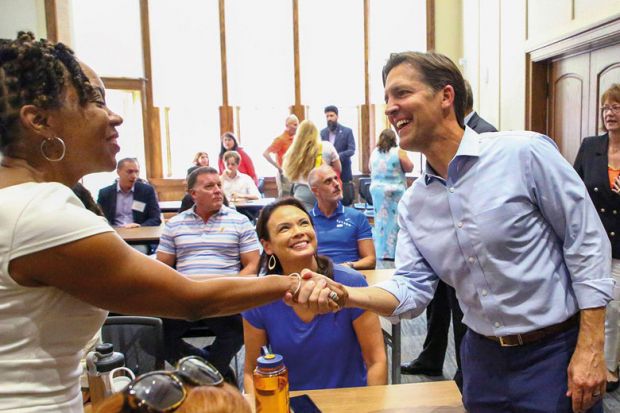A year after taking the presidency of the University of Florida amid faculty anxiety and student protest, former Republican US senator Ben Sasse appears to have eased fears at the flagship institution of the US state best known for political interference in higher education.
Benefiting from factors that include low expectations and an infusion of financial resources, Dr Sasse has managed since his installation last February to win expressions of admiration from faculty for his energy and ideas, while apparently defusing tensions with students.
Dr Sasse appears to be benefiting in particular from a state legislature that ultimately looks as eager to build up its top universities as dictate their academic agendas, especially after the departure last month of Florida’s right-wing governor, Ron DeSantis, from the US presidential race.
“Faculty are calmer,” now that they have seen a year of the Sasse presidency, without the ideological purges that some thought might be coming, said Danaya Wright, a professor of constitutional law at the University of Florida who serves as chair of the Faculty Senate.
“I don’t like his politics, I don’t agree with some of what I thought he might be doing, and even may still do,” Professor Wright said of Dr Sasse. “But at the same time, there was this reaction to him and to the announcement that was probably overblown.”
Dr Sasse is a former president of Nebraska’s 1,500-student Midland University who spent eight years as a Republican member of the US Senate before taking the Florida presidency from a veteran administrator who suggested frustration with the political battles. He arrived at the 60,000-student campus in Gainesville to some sustained protests, driven as much by his own record – notably his opposition to LGBTQ rights – as that of Mr DeSantis, who made persistent efforts as a presidential hopeful to demonise higher education and control its curriculum and speech.
Dr Sasse used threats of disciplinary measures to quiet the demonstrations, then largely retreated from public sight for months, ending the confrontations. It was time away from the spotlight that Dr Sasse explained as an opportunity to learn about the institution and its needs.
He eventually emerged with “8,000 ideas of how to improve higher education”, which Professor Wright described as being positive, if “very generic”.
Other faculty have talked encouragingly about Dr Sasse’s apparent willingness to engage freely on matters of contention, such as revisions to core requirements.
Dr Sasse’s relations with the university’s faculty also got a major boost last year when the state legislature gave the institution an extra $130 million (£100 million) to spend on priorities, much of which the president has been doling out in research funding. “That is something that is really valuable and important for faculty,” Professor Wright said.
The calmer atmosphere also appears to reflect a pragmatic recognition of interests on both sides, Professor Wright said. Mr DeSantis may have been willing to decapitate the leadership of a small institution such as the New College of Florida, where a former top Republican state lawmaker has been made president, “but he’s not going to mess with” a place as important to the state as the University of Florida, she said.
“I hope that we’re off this,” she said of the more high-profile acts by Mr DeSantis and Republican lawmakers to make a public show of fighting programmes to improve social diversity, “and that we can just let the universities continue to be really excellent.
“And I think if we get the politics out,” she said, “Sasse will be a perfectly acceptable president.”




